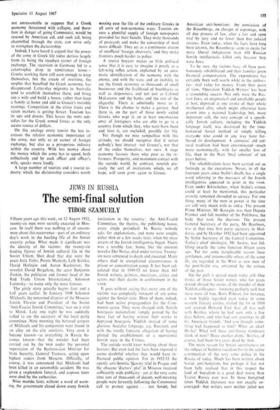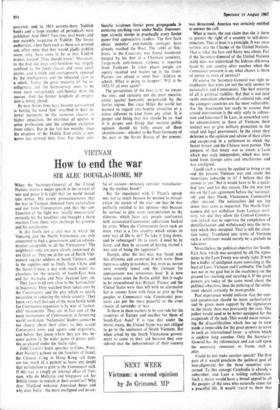The semi-final solution
JEWS IN RUSSIA TIBOR SZAMUELY
Fifteen years ago this week, on 12 August 1952, twenty-six men were secretly executed in Mos- cow. In itself there was nothing at all uncom- mon about this occurrence—part of an ordinary day's work in the bustling life of the Soviet security police. What made it significant was the identity of the victims: the twenty-six leading figures of Jewish cultural life in the Soviet Union. Shot dead that day were the poets Itzik Fefer, Peretz Markish, Leib Kvitko, David Hofstein and Aaron Kushnirov, the novelist David Bergelson, the actor Benjamin Zuskin, the politician and former head of the Red Trade Union International, Solomon Lozovsky—to name only the most famous.
The grisly story actually begins four and a half years earlier. In January 1948 Solomon Mikhoels, the renowned director of the Moscow Jewish Theatre and President of the Soviet `Anti-Fascist Jewish Committee,' was on a visit to Minsk. Late one night he was suddenly called to see the secretary of the local party committee. Next morning the battered corpses of Mikhoels and his companion were found in an alley on the city outskirts. Very soon it became known—as everything in Russia be- comes known—that the murder had been carried out by the MGR under the personal supervision of the Byelorussian Minister for State Security, General Tsanava, acting upon highest orders from Moscow. Officially, of course, it was announced that Mikhoels had been killed in an automobile accident. He was given a resplendent funeral, and copious tears were shed by the authorities.
Nine months later, without a word of warn- ing, the government closed down every Jewish institution in the country: the Anti-Fascist Committee, the theatre, the publishing house, every single periodical. In Russia nobody asks for explanations, and none were sought, either then or a few weeks later, when the mass arrests of the Jewish intelligentsia began. Theirs was a terrible fate. Some, like the eminent novelist Der Nistar, died under torture. Twenty- six were sentenced to death and executed. Many others died in unexplained circumstances in prison or concentration camp. It has been cal- culated that in 1949-53 no fewer than 443 Jewish writers, painters, musicians, critics and actors met their deaths in confinement in the
USSR.
It goes without saying that every one of the victims was completely innocent of any crime against the Soviet state. Most of them, indeed, had been active propagandists for the Com- munist cause. They were charged with 'Jewish bourgeois nationalism', (amply proved by the mere fact of having written their works in depraved bourgeois Yiddish instead of some glorious Socialist language, e.g. Russian), and with the totally fantastic allegation of having plotted the establishment of a secessionist Jewish state in the Crimea.
The outside world knew nothing about these horrors. But even had the facts been exposed it seems doubtful whether they would have in- fluenced public opinion. For in 1952-53 the openly anti-Semitic Siansky trial in Prague and the obscene 'doctors' plot' in Moscow received sufficiently wide publicity—yet at the very same time tens of thousands of decent, well-meaning people were fervently following the Communist call to protest against . . . not Soviet, but American anti-Semitism: the conviction of the Rosenbergs, on charges of espionage, with all due process of law, after a fair and open trial by jury and no fewer than five judicial reviews. Even today, when the facts have long been known, the Rosenbergs seem to excite far more liberal indignation than 450 Russian Jewish intellectuals, killed only because they were Jews.
To be sure, the victims have all been post- humously rehabilitated and their families given financial compensation. The expenditure has certainly been well worth while to the authori- ties—real value for money. From their point of view, 'Operation Yiddish Writers' has been a resounding success. Not only were the Rus- sian Jews, an enigmatical and unreliable people at best, deprived at one stroke of their whole intellectual elite, which might otherwise have grown into a national leadership, but, more important still, the very concept of a specifi- cally Jewish culture, including the Yiddish language itself, was destroyed by the time- honoured Soviet method of simply killing everyone who could in any way have fur- thered its development. A centuries' old cul- tural tradition had been exterminated—much more economically, with far smaller loss of life, than in the Nazi 'final solution' of ten years before.
The rehabilitations have been carried out as furtively as the executions. Never, in all the fourteen years since Stalin's death, has a single word referring to the massacre of the Jewish intelligentsia appeared in print in the USSR. Even tinder Khrushchev, when Stalin's crimes could at least be mentioned, this particular atrocity remained shrouded in secrecy. For one thing, many of the men in power at the time are still very much with us today. The present Prime Minister, Mr Kosygin, was then Deputy Premier and full member of the Politburo, the body that took the decision. The present General Secretary of the party, Mr Brezhnev, was at that time first party secretary in Mol- davia, and by October 1952 had been appointed by Stalin Secretary of the Central Committee. Today's chief ideologist, Mr Suslov, was ful- filling exactly the same function fifteen years ago. Yet for some inexplicable reason these gentlemen, and innumerable others of the same ilk, are regarded in the West as new men of the post-Stalin era, untainted by the crimes of the past.
But the guilt is spread much wider still. One thinks of those Soviet writers who for years denied abroad the stories of the murder of their Yiddish colleagues—knowing perfectly well that these were all true. Boris Polevoi, for instance, a man highly regarded even today in some western literary circles, visited the us in 1954 and assured Howard Fast that all was well with Kvitko, whom he had seen only a few days before, and who had sent greetings to all his American friends. 'And you thought some- thing had happened to him? What an ideal Ha-ha! What will these anti-Soviet slanderers think of next? Have another drink.' Kvitko, of course, had been two years dead by then.
The main reason for Soviet .secretiveness on the subject of Stalinist racialism lies in the active continuation of the very same policy in the Russia of today. Much has been written about Soviet anti-Semitism, but perhaps it has not been fully realised that in this respect the land of Socialism is a good deal worse than Tsarist Russia ever was. In those benighted times Yiddish literature was not exactly en- couraged—but writers were neither jailed nor
executed, and in 1913 seventy-three Yiddish books and a large number of periodicals were published. And 1966? Two (yes, two) books and one monthly magazine in Yiddish. The Soviet authorities, when facts such as these are pointed out, often reply that they would gladly publish more, only there seem to be so few Yiddish writers around. They should know! Moreover, in the bad old days anti-Semitism was largely confined to the lower classes and some court circles, and actively and courageously opposed by the intelligentsia and the educated class as a whole. Today the great majority br the in- telligentsia and the bureaucracy seem to he even more outspokenly anti-Semitic than the masses. And the former loophole of emigra- tion is firmly closed.
By now Soviet Jews have become accustomed to having the word 'Jew' inscribed in their in- ternal passports, to the numerus clausus in higher education, the existence of quotas in some professions and the complete exclusion from others. But in the last few months, since the eruption of the Middle East crisis, a new ferror has entered their lives. For sheer anti-
Semitic virulence Soviet press propaganda is outdoing anything seen under Stalin. Stuermer- type atrocity stories in practically every Soviet paper find appreciative readers. The first facts about 'popular' anti-Semitic outrages have already reached the West. The rabbi of Suk- humi, in the Caucasus, was found murdered, hanged by his feet in a Christian cemetery. Large-scale anti-Semitic violence is reported from Tashkent. In other places people are openly insulted and beaten up in the street. Parents are afraid to send their children to school. What is going to happen? Will it be 1952-53 all over again?
The persecution of the Jews is by no means the only, and certainly not the most massive, crime against- humanity perpetrated by the Soviet regime. But since Hitler the world has learned to regard anti-Semitic atrocities as a crime different in kind from any other. It is proper and fitting that this should be so. And it is proper and fitting that western public opinion should be fully aware of these abominations—whether in the Nazi Germany of the past or the Soviet Russia of the present.































 Previous page
Previous page